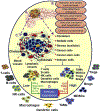MUCIN-4 (MUC4) is a novel tumor antigen in pancreatic cancer immunotherapy
- PMID: 31952903
- PMCID: PMC7160012
- DOI: 10.1016/j.smim.2020.101391
MUCIN-4 (MUC4) is a novel tumor antigen in pancreatic cancer immunotherapy
Abstract
Pancreatic cancer (PC) is a highly lethal malignancy with a dismal five-year survival rate. This is due to its asymptomatic nature, lack of reliable biomarkers, poor resectability, early metastasis, and high recurrence rate. Limited efficacies of current treatment modalities treatment-associated toxicity underscore the need for the development of immunotherapy-based approaches. For non-resectable, locally advanced metastatic PC, immunotherapy-based approaches including vaccines, antibody-targeted, immune checkpoint inhibition, CAR-T-cells, and adoptive T-cell transfer could be valuable additions to existing treatment modalities. Thus far, the vaccine candidates in PC have demonstrated modest immunological responses in different treatment modalities. The identification of tumor-associated antigens (TAA) and their successful implication in PC treatment is still a challenge. MUC4, a high molecular weight glycoprotein that functionally contributes to PC pathogenesis, is an attractive TAA. It is not detected in the normal pancreas; however, it is overexpressed in mouse and human pancreatic tumors. The recombinant MUC4 domain, as well as predicted immunogenic T-cell epitopes, elicited cellular and humoral anti-MUC4 response, suggesting its ulility as a vaccine candidate for PC therapy. Existence of PC-associated MUC4 splice variants, autoantibodies against overexpressed and aberrantly glycosylated MUC4 and presence of T-cell clones against the mutations present in MUC4 further reinforce its significance as a tumor antigen for vaccine development. Herein, we review the significance of MUC4 as a tumor antigen in PC immunotherapy and discuss both, the development and challenges associated with MUC4 based immunotherapy. Lastly, we will present our perspective on MUC4 antigenicity for the future development of MUC4-based PC immunotherapy.
Keywords: Immunotherapy; MUC4; Neoantigen; Pancreatic cancer; Vaccine.
Copyright © 2020 Elsevier Ltd. All rights reserved.
Conflict of interest statement
Figures



References
-
- Siegel RL, Miller KD, Jemal A, Cancer statistics, 2019, CA: a cancer journal for clinicians 69(1) (2019) 7–34. - PubMed
-
- Stathis A, Moore MJ, Advanced pancreatic carcinoma: current treatment and future challenges, Nature Reviews Clinical Oncology 7 (2010) 163. - PubMed
-
- Werner J, Combs SE, Springfeld C, Hartwig W, Hackert T, Büchler MW, Advanced-stage pancreatic cancer: therapy options, Nature Reviews Clinical Oncology 10 (2013) 323. - PubMed
-
- Neoptolemos JP, Kleeff J, Michl P, Costello E, Greenhalf W, Palmer DH, Therapeutic developments in pancreatic cancer: current and future perspectives, Nature Reviews Gastroenterology & Hepatology 15(6) (2018) 333–348. - PubMed
-
- Wang Z, Li Y, Ahmad A, Banerjee S, Azmi AS, Kong D, Sarkar FH, Pancreatic cancer: understanding and overcoming chemoresistance, Nature Reviews Gastroenterology &Amp; Hepatology 8 (2010) 27. - PubMed
Publication types
MeSH terms
Substances
Grants and funding
LinkOut - more resources
Full Text Sources
Medical

